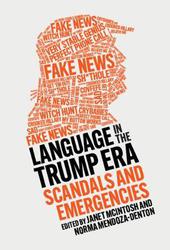
|
Language in the Trump Era: Scandals and Emergencies
Hardback
Main Details
| Title |
Language in the Trump Era: Scandals and Emergencies
|
| Authors and Contributors |
Edited by Janet McIntosh
|
|
Edited by Norma Mendoza-Denton
|
| Physical Properties |
| Format:Hardback | | Pages:300 | | Dimensions(mm): Height 160,Width 235 |
|
| Category/Genre | Sociolinguistics |
|---|
| ISBN/Barcode |
9781108841146
|
| Classifications | Dewey:973.933 |
|---|
| Audience | | Professional & Vocational | |
|---|
| Illustrations |
Worked examples or Exercises
|
|
Publishing Details |
| Publisher |
Cambridge University Press
|
| Imprint |
Cambridge University Press
|
| Publication Date |
3 September 2020 |
| Publication Country |
United Kingdom
|
Description
Early in his campaign, Donald Trump boasted that 'I know words. I have the best words', yet despite these assurances his speech style has sown conflict even as it has powered his meteoric rise. If the Trump era feels like a political crisis to many, it is also a linguistic one. Trump has repeatedly alarmed people around the world, while exciting his fan-base with his unprecedented rhetorical style, shock-tweeting, and weaponized words. Using many detailed examples, this fascinating and highly topical book reveals how Trump's rallying cries, boasts, accusations, and mockery enlist many of his supporters into his alternate reality. From Trump's relationship to the truth, to his use of gesture, to the anti-immigrant tenor of his language, it illuminates the less obvious mechanisms by which language in the Trump era has widened divisions along lines of class, gender, race, international relations, and even the sense of truth itself.
Author Biography
Janet McIntosh is Professor of Anthropology at Brandeis University. Her work focuses on linguistic and sociocultural anthropology in the United States and sub-Saharan Africa. Her 2016 book, Unsettled: Denial and Belonging among White Kenyans (University of California Press), received Honorable Mention in the 2018 American Ethnological Society Senior Book Prize and Honorable Mention in the 2017 Victor Turner Prize for Ethnographic Writing. Her 2009 book, The Edge of Islam: Power, Personhood, and Ethnoreligious Boundaries on the Kenya Coast (Duke University Press) won the 2010 Clifford Geertz Prize in the Anthropology of Religion. She has published articles in Journal of Linguistic Anthropology, Language and Communication, Signs and Society, Journal of Pragmatics, and numerous journals in sociocultural anthropology. She is on the Editorial Boards of Oxford Studies in the Anthropology of Language (Oxford University Press), the journal Cultural Anthropology, and Journal of Religion in Africa. Funded by an ACLS faculty fellowship, she has embarked on a study of language in the United States military. Norma Mendoza-Denton is Professor of Anthropology at the University of California at Los Angeles. In her work at the intersection of language, youth subculture, ethnicity and politics, she has focused on topics ranging from gang members in California to Republican Town Hall meetings in Arizona. She has authored over 50 book chapters and journal articles in the fields of Linguistics, Anthropology, Communication, and Education. She received a Rockefeller Foundation Bellagio Fellowship for the completion of her book Homegirls: Language and Cultural Practice in Latina Youth Gangs (Wiley Blackwell, 2008); the second edition is slated to include a graphic novelette. Past president of the Society for Linguistic Anthropology, she has served on the Executive Boards of the American Anthropological Association, the Society for Visual Anthropology and currently for the Linguistic Society of America. Her other manuscript in progress, Citizen Rage, addresses the linguistic dynamics of town hall meetings and other public events in American politics.
Reviews'An indispensable resource for anyone troubled by the polarizing and demagogic political discourse of the Trump era, this book illuminates many features of Trumpian rhetoric and shows how its flagrant misrepresentations, fractured syntax, torrential flow, racist metaphors, and misogyny appeal to some people, co-opt others, and prove resistant to critique. If you hope to counter these forms of current political rhetoric, start by understanding how they work - and start here.' Judith T. Irvine, Edward Sapir Distinguished University Professor Emerita of Linguistic Anthropology, University of Michigan 'Donald Trump's version of making a speech is not only a source of surprise and disgust, but also, for many, confusion. Why does he talk this way? Is it on purpose? And is it contagious? Language in the Trump Era answers all of those questions and more about America's magnificently, manipulatively inarticulate Commander-in-Chief.' John McWhorter, Associate Professor of English and Comparative Literature at Columbia University 'This excellent volume is a 'must-read' for scholars and students alike. The first comprehensive, very well researched and well-argued book which allows insight in to the 'Trump-phenomenon'; a phenomenon which dominates politics, media and everyday lives in the US and beyond.' Ruth Wodak, Distinguished Professor and Chair in Discourse Studies, Lancaster University/University Vienna 'Language in the Trump Era is a very topical and most welcome publication on the (negative) effects of the Trump presidency on language use and understanding. The book can be seen as an important contribution to the emerging research on Trump's language that came into being since he ran for the US presidency. It provides an accurate and detailed description of the linguistic transformations brought about by the Trump era while also, importantly, accounting for the range of complex and interlaced motivations for the attested changes in language and indicating possible repercussions of the newly installed linguistic habits on society at large, including the potential legitimization of certain, social behaviors.' Marta Degani, Discourse & Society 'Overall, the book provides fascinating insight into the language of Trump and would be of interest to postgraduate students, scholars/researchers in linguistics, as well as the broader social sciences and/or those who are interested in understanding the discursive features of one of the world's most controversial presidents.' Neda Salashour, Language in Society
|